Master ChatGPT project sharing for teams. Step-by-step guide to share chats, collaborate with colleagues, and organize projects across your workspace.
Until now, ChatGPT users could only share individual chat threads, creating frustrating silos of information and limiting true collaboration.
That all changes with the new Project Sharing feature, which allows teams to create shared workspaces with custom instructions, uploaded files, and collaborative conversations—all within the familiar ChatGPT interface.
This article will walk you through:
- How to create and share projects with the right permission settings
- Managing team access within and across your organization
- Real-world applications that can immediately boost your team's productivity
Currently available on ChatGPT Teams, Enterprise, and Education accounts (with plans to expand to Plus and Pro), this feature arrives as businesses increasingly seek ways to break down AI knowledge silos. Whether you're managing content creation, client projects, or internal knowledge bases, Project Sharing transforms ChatGPT into a powerful team collaboration hub.
Until recently, ChatGPT users faced a significant limitation: they could only share individual chat threads. This created information silos, hindered knowledge transfer, and limited collaboration between team members. Project Sharing fundamentally changes this dynamic by allowing entire AI workspaces to be shared and edited collaboratively.
What can you do with Project Sharing?
- Create dedicated project spaces with their own memory context
- Share entire collections of conversations, not just individual threads
- Establish custom instructions that guide all interactions within the project
- Upload and share relevant files and resources
- Set different permission levels for team members
Unlike simple chat sharing, Project Sharing creates a persistent collaborative environment where multiple team members can contribute to and benefit from the same AI workspace.
Key components of ChatGPT Projects
Project memory
Projects use isolated memory contexts that are separate from your personal chat history. This means:
- Conversations within a project only reference other conversations in that same project
- Your personal chat history doesn't leak into shared projects
- Team members see only project-relevant context, maintaining privacy and focus
Permission levels
Project Sharing offers two distinct access levels:
- Can Chat: Team members can view project content and have conversations within the project
- Can Edit: Team members can modify project settings, instructions, and upload or remove files
Project instructions
One of the most powerful aspects of shared projects is the ability to create custom instructions that:
- Guide how ChatGPT responds to all conversations within the project
- Maintain consistent tone, style, and approach across team members
- Provide context-specific knowledge that applies to the entire project
Why Project Sharing matters for teams
Knowledge fragmentation
Instead of insights being trapped in individual chat histories, they become accessible to the entire team
Consistency issues
Custom instructions ensure all team members receive similar responses for similar queries
Collaboration barriers:
Multiple team members can now build upon each other's work within the same AI environment
Current Availability
As of this writing, Project Sharing is available on:
- ChatGPT Teams accounts
- Enterprise subscriptions
- Education accounts
OpenAI has indicated plans to expand this functionality to Plus and Pro subscriptions in the future, making collaborative AI accessible to a broader audience.
Watch this video for a full overview
[YouTube: https://www.youtube.com/embed/vTqPsRez0_E?iv_load_policy=3&rel=0&modestbranding=1&playsinline=1&autoplay=0&mute=1]
1. Create your first project
Create a new project with a descriptive name that clearly communicates its function to team members.
- Click on "New Project" in your ChatGPT interface
- Name your project something specific (e.g., "YouTube Content Plan")
- Select an icon that visually represents the project's purpose
- Choose "Project Only" for memory settings
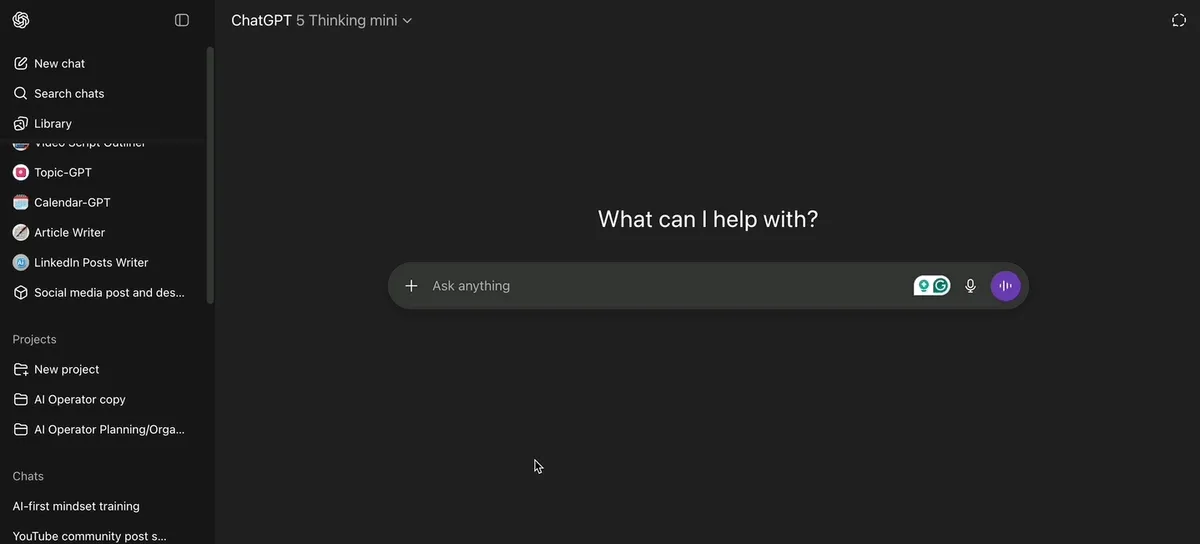
💡 The "Project Only" memory setting is critical — This ensures conversations within your project don't access your personal chat history, maintaining privacy when sharing with team members.
⚠️ This setting cannot be changed later, so select it correctly from the start.
2. Set up Project instructions
Custom instructions guide how ChatGPT responds to everyone in your shared workspace. They also ensure consistency across all team members using the project, regardless of who initiates conversations with the AI.
- Click "Add Instructions" in your project
- Create comprehensive guidelines for how the AI should respond
- Include project context, goals, and specific parameters
- Use markdown formatting for better organization (headings with #, ## for subheadings)
Example project instruction structure:
# Project Purpose
Brief description of what this project aims to accomplish
## Content Guidelines
- Tone and style requirements
- Specific formats to follow
- Key messaging to include
## Process Boundaries
- What's in scope for this project
- What's out of scope
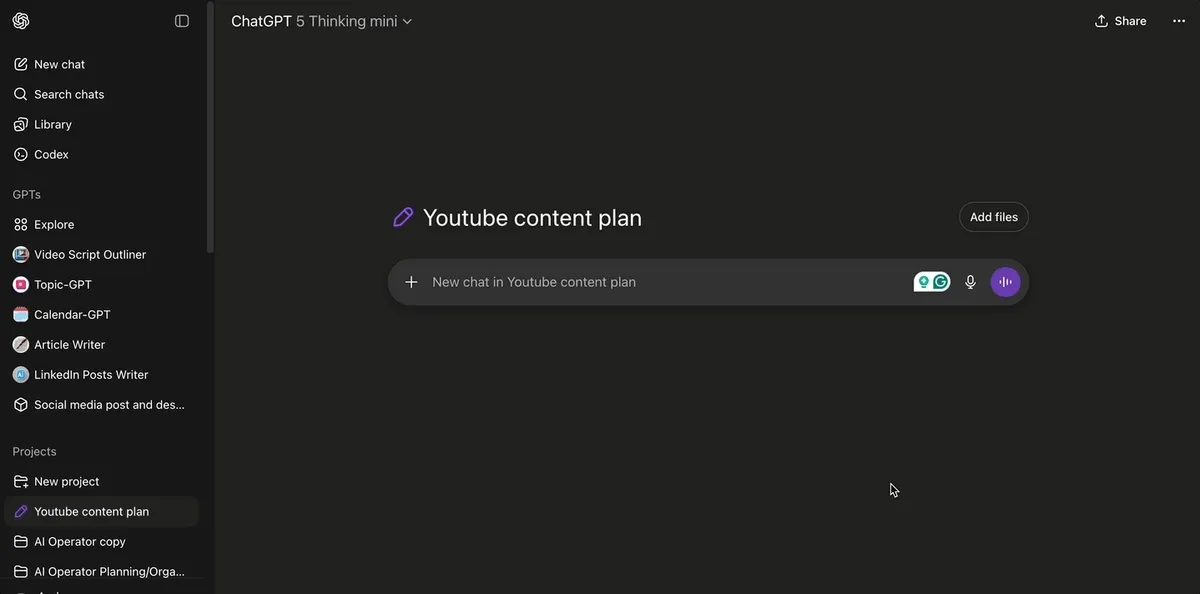
3. Share your Project with team members
The sharing process is straightforward, allowing you to control exactly who can access your project and what they can do within it.
- Click the "Share" button at the top of your project
- Enter team members' email addresses
- Set appropriate permission levels for each person
- Choose between organization-wide or invitation-only access
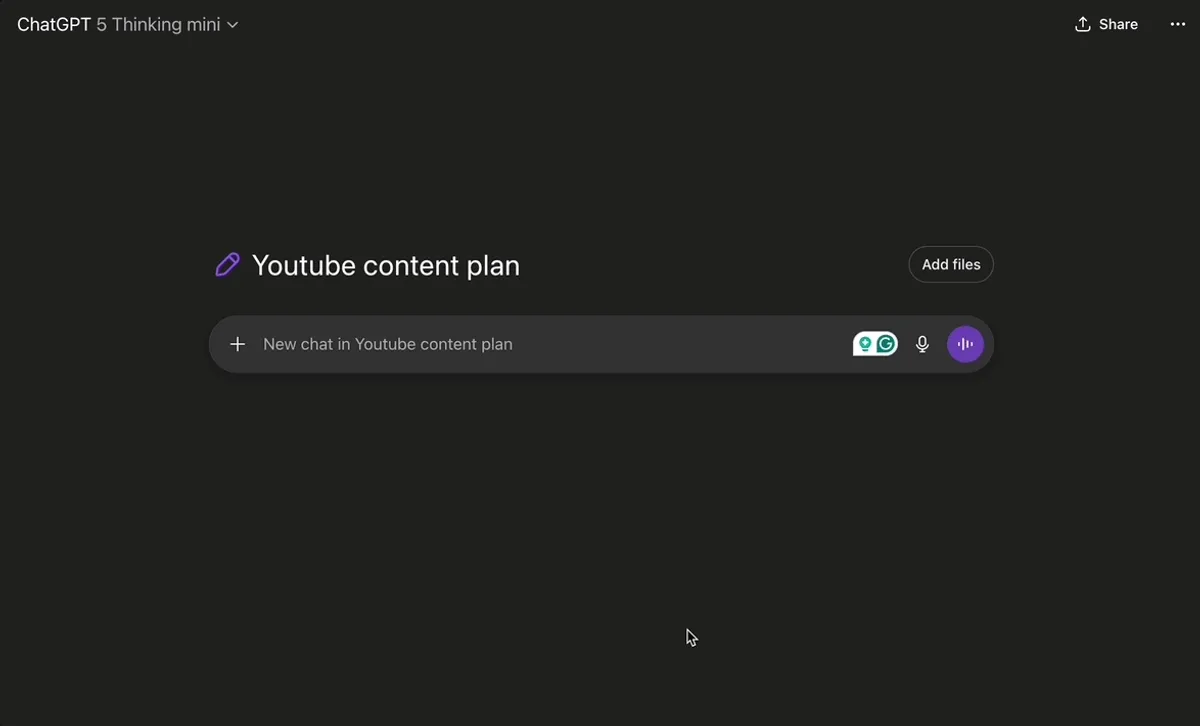
💡 Permission levels determine what team members can do:
- Can Chat: Team members can view project content and have conversations within the project
- Can Edit: Team members can modify project settings, change instructions, and upload or remove files
For sensitive projects, select "Only those invited" under access settings. For broader team resources, you can enable "Anyone at [your organization] with the link."
4. Add files and resources
Shared files create a common knowledge base for your project that all team members can reference.
- Click "Add Files" within your project
- Upload relevant documents, spreadsheets, or other resources
- These files become accessible to anyone with project access
- Files provide context for AI conversations within the project
Files uploaded to projects become reference points that ChatGPT can use when responding to queries within that project, creating a more informed collaborative environment.
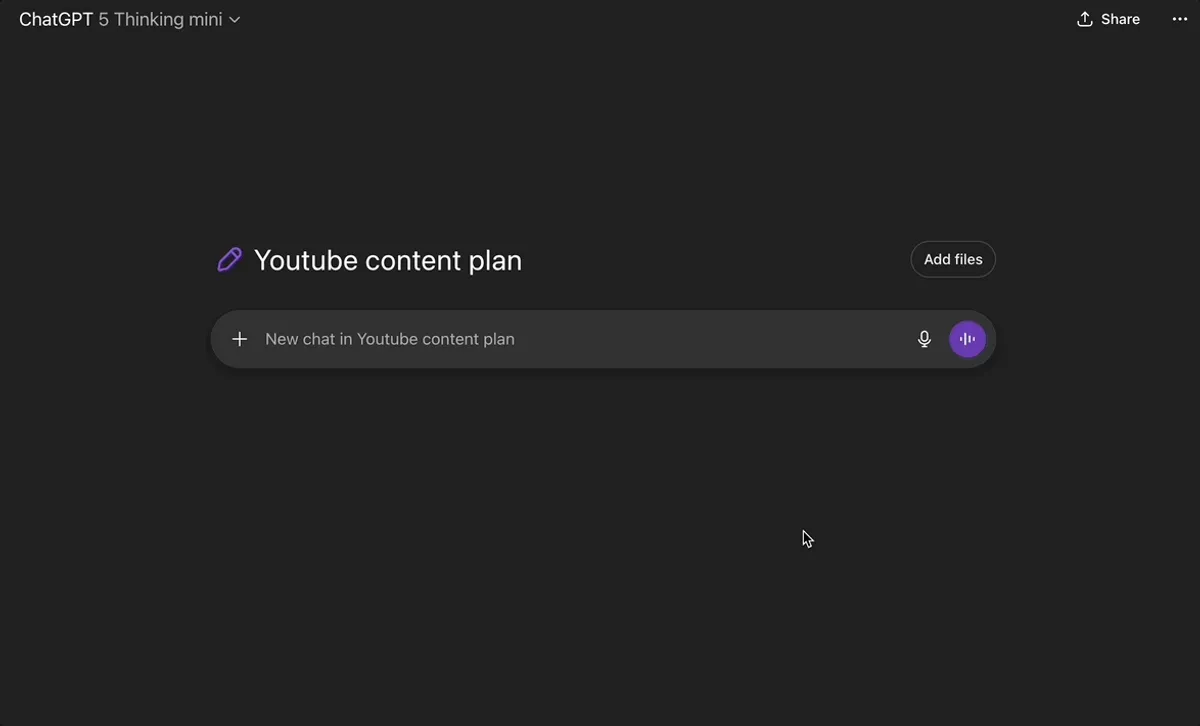
5. Manage collaborative workflows
- Create separate chat threads within projects for different topics or workflows
- Use descriptive names for each chat thread to maintain organization
- Team members can continue conversations started by others
- All project participants can see updates in real-time
6. Manage notifications
Stay informed about project activity without overwhelming your inbox:
- Project email notifications are enabled by default
- Team members receive alerts when added to projects
- To adjust settings, go to ChatGPT Settings → Notifications
- Toggle "Project email notifications" on or off based on your preferences
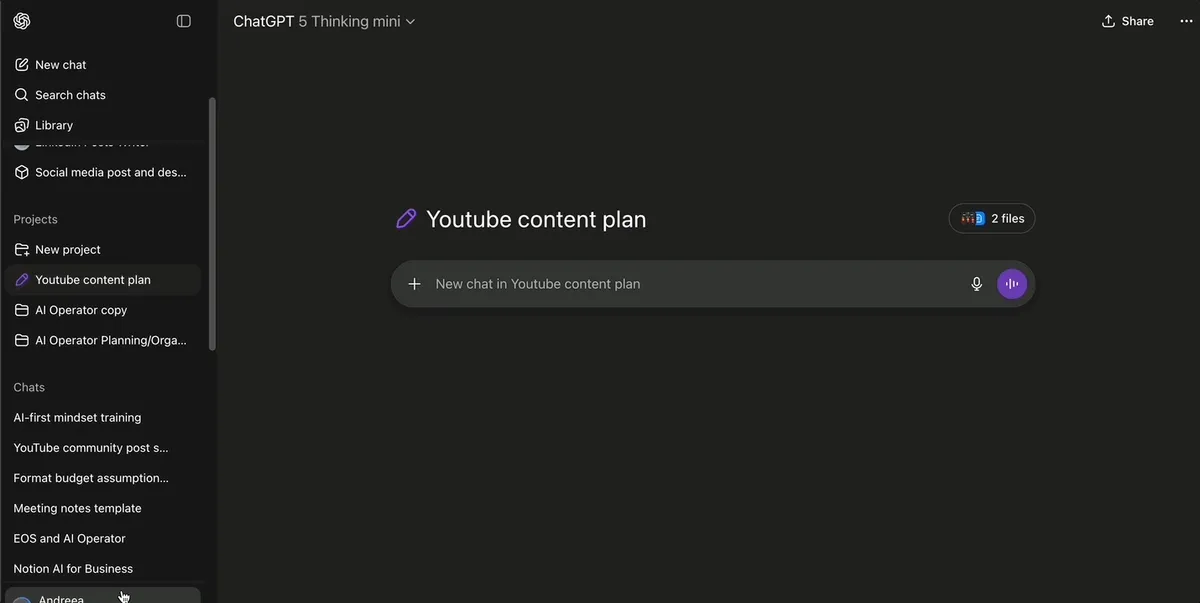
7. Understand Project ownership and management
Project creators have different capabilities than those invited to participate:
- Project owners can rename and delete projects
- Team members who were invited see a "Leave project" option instead
- Both owners and editors (with "Can Edit" permissions) can invite additional team members
Double-clicking on a project name allows for quick renaming — but coordinate with the project owner before making such changes to avoid confusion.
Practical benefits
- Content teams maintain a consistent voice and strategy across creators
- Client projects benefit from dedicated workspaces with relevant context and history
- Research initiatives easily share findings and build on collective insights
- Training resources are improved with internal knowledge bases accessible to all team members
The most effective projects have clear purposes and well-defined workflows that all team members understand and follow consistently.
ChatGPT's Project Sharing eliminates information silos and creates true collaborative environments where teams can build on each other's work.
Key takeaways from this guide:
- Create purpose-driven projects with clear instructions and "Project Only" memory settings to maintain privacy
- Set appropriate permissions ("Can Chat" vs. "Can Edit") based on team members' roles and responsibilities
- Organize conversations within projects using descriptive thread names for better navigation
- Upload relevant files to create a shared knowledge base accessible to all project members
- Establish clear workflows for how your team will collaborate within shared projects
Ready to transform your team's collaboration? Start by creating your first shared project today and invite key team members to experience the power of collaborative AI.
More Articles

Zapier: How to build AI-powered automations in less than one hour
Build AI-powered Zapier automations in under an hour. Step-by-step guide to automate emails, leads, and workflows with AI intelligence.

Claude for work: How to use Claude Skills and Artifacts to 10x team efficiency
Learn how to use Claude Skills and Artifacts to automate team workflows. Step-by-step guide to building reusable tools without code for 10x efficiency.

AI Connectors 101: Turn your LLM into a business powerhouse
Connect ChatGPT and Claude to your business tools like Gmail, CRM, and Notion. Learn how AI connectors automate workflows and save hours per week.

